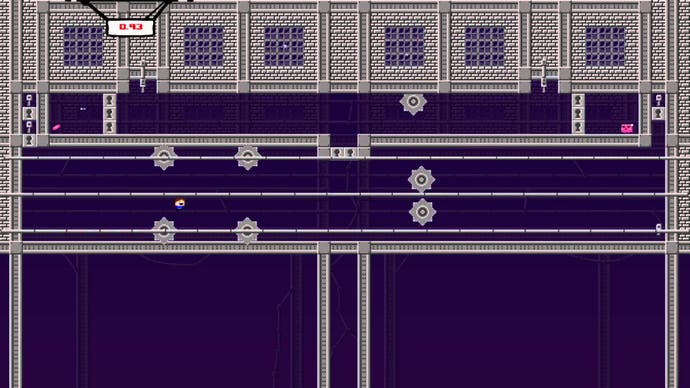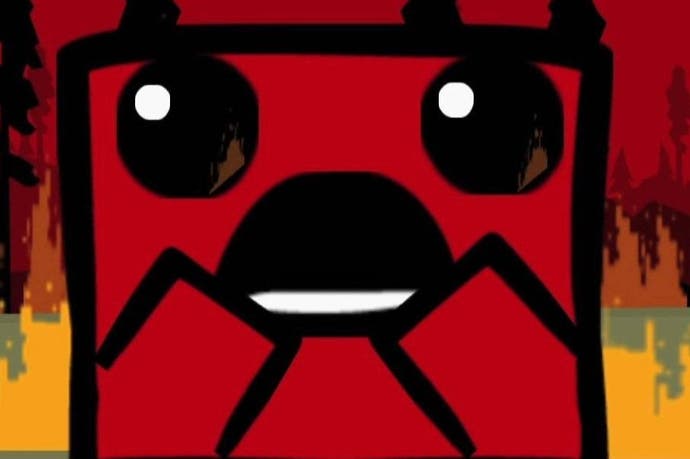Xbox 360 at 10: Super Meat Boy's retro foresight
Paint the town red.
It may not seem like it now, but Super Meat Boy was one of the Xbox 360's most surprising success stories - indeed, one of the most surprising success stories of the last generation. An enhanced, expanded version of developer Team Meat's free flash game, Meat Boy, the odds were firmly stacked against it.
While there's certainly no shortage of independent retro 2D platformers these days, this was not the case in October 2010, when Super Meat Boy launched. It's not that long ago, but this was still before the market got flooded with the likes of Dustforce, Axiom Verge, Ori and the Blind Forest and Guacamelee. Even Vlambeer, the master of bite-sized 2D arcade titles like Luftrausers and Ridiculous Fishing, wouldn't release its popular commercial debut, Super Crate Box, until two days after Super Meat Boy arrived on XBLA.
There were some exceptions, of course. 'Spolsion Man, Bionic Commando: Rearmed and Shadow Complex made waves on Microsoft's digital marketplace, but those still touted 3D graphics. These were expensive, cutting-edge consoles, after all. Would people really want to dedicate their Xbox 360 and HDTV to playing something that looked like little more than a Flash game?

The answer, of course, was: of course! Super Meat Boy didn't boast impressive tech, but that didn't matter. People came to Super Meat Boy for three reasons: it was easy to learn, engaging in the moment, and perfectly paced.
Most stages in Super Meat Boy last between 15 and 40 seconds. Death comes frequently, but only in its final, lengthier stages does this feel like a frustrating setback. Instead, every time Meat Boy pleasantly pops into a pool of cutesy carnage, it's more funny than frustrating. Most stages in Super Meat Boy are so comically hazardous that massive failure is expected, an idea made explicit by a brilliant feature that lets you watch all your attempts play out in unison as dozens (maybe hundreds) of Meat Boys brave a gauntlet of horrors until only one valiant soul remains. The more you lose, the more epic and entertaining this inevitable reflection is.
It helps that respawning is instantaneous and levels are varied, ranging from tight obstacle courses to more open plains where players can find their own path to success via one of the most refined two-button control schemes ever to grace a video game. Amusingly, the player's path is paved in blood, as Meat Boy's lack of skin ensures that he leaves a mess on any surface he graces. It's a clever idea that adds texture and a feeling of progress as our hero paints the town red.

Developer Edmund McMillen's twisted sense of humour later spawned the disturbing child abuse allegory The Binding of Isaac, and revisiting Super Meat Boy today, it's even more apparent how cruel this love letter to arcade gaming can be. Not only does it star a man, nay, a child born without skin, but his nemesis is a stillborn foetus who has no compunction about viciously slaughtering cute critters to get what he wants. This dichotomy between the whimsical art style and playful platforming with outlandish tragedy and gross-out guffaws gives the game a strong personality in a genre that has historically aimed for the kiddie pool. McMillen's humour in Super Meat Boy never reaches the controversial realm of something like South Park, nor does it aspire to - but it has more bite than you might expect, while still maintaining a sense of reverence for its genre forbears.
Super Meat Boy ended up a colossal success, shifting over a million copies between its Xbox Live Arcade and Steam versions. Whether McMillen and his partner Tommy Refenes set out to prove anything or not, Team Meat's ode to old-school platformers ended up one of the last console generation's most influential games. It sat at the forefront of the resurgence of the 2D platformer, and proved that simplistic graphics and sadistic challenges could still engage the masses in an age where games were in an arms race to push more polygons and provide more accessible assignments.
Super Meat Boy gets its name from Super Mario Bros., and that's no coincidence. Team Meat's plucky platformer really is a spiritual successor to Shigeru Miyamoto's 1985 masterpiece. And just as Mario's console debut remains enjoyable over three decades later, Super Meat Boy will likely withstand the test of time as well. Super Meat Boy may have looked behind the times in 2010, but it was secretly ahead of them.









